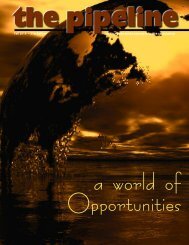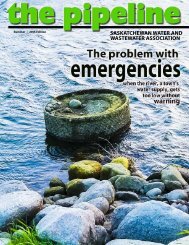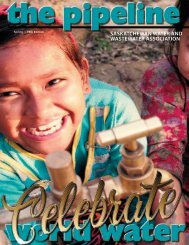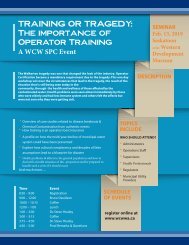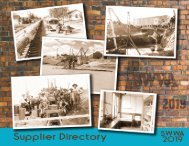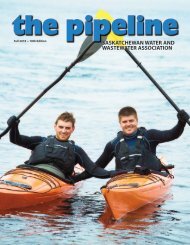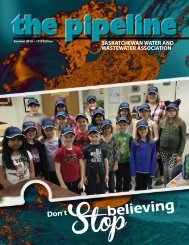WINTER 2017
Create successful ePaper yourself
Turn your PDF publications into a flip-book with our unique Google optimized e-Paper software.
Winter <strong>2017</strong> ~ 15th Edition<br />
SASKATCHEWAN WATER AND<br />
WASTEWATER ASSOCIATION
Winter<br />
The pipeline is produced quarterly by the<br />
Saskatchewan Water and Wastewater Association.<br />
Produced by Campbell Printing Ltd., Prince Albert, SK<br />
For article /photograph submissions or for further<br />
information or content ideas please contact<br />
SWWA Office Manager Calle Behnke<br />
Work: 306-668-1278<br />
Toll Free: 888-668-1278<br />
Email: office@swwa.ca<br />
Box 7831 Saskatoon, SK S7K 4R5<br />
3<br />
20<br />
17<br />
4| Kelly’s Corner<br />
5| Post Conference<br />
6| Education & Training<br />
7| Ice Fishing Safety<br />
8| 37th Annual Conference Invitation<br />
12| Safe Water For All<br />
14| Conference Collage<br />
18| Making a Difference in a Childs Life<br />
19| Conference Sponsors<br />
20| World Toilet Day<br />
22| Conference Collage<br />
26| Don’t Be The Weakest Link<br />
28| Celebrating Clean<br />
Water for Schools<br />
30| Do You Have It?<br />
31| Pipe Up - Board<br />
Game for Water<br />
Awareness<br />
9<br />
17
Every December, I like to take a look back and reflect on things that<br />
happened or I did in the past year. I find it helps me to appreciate and<br />
be thankful as well as keep things in perspective. So in honor of some<br />
reflection here goes my top 10 SWWA moments of the year.<br />
1<br />
Trying to keep a hat on during the golf tournament<br />
2<br />
while avoiding a sun/windburn<br />
Don Webb in the tapping workshop saying he is<br />
just going to sit and listen while Jordan teaches.<br />
7<br />
10<br />
3 4<br />
5<br />
6<br />
The Pipeline going fully digital with apps for both<br />
Android and IOS<br />
The 2018 Calendar, and all those amazing<br />
photos you sent in or had us take for you.<br />
The <strong>2017</strong> tradeshow – had a fantastic time learning<br />
and networking with all who attended.<br />
Attending the Keynote Speaker, Darby Allen, it was<br />
such an emotional and riveting talk. I am not<br />
ashamed to admit the tears were there.<br />
Bruce Davidson, talking about the after effects of<br />
Walkerton and his sharing of the emotional and physical<br />
toll on his own family. How he really made it plain that<br />
training and education is the best tool an operator can<br />
have in their arsenal.<br />
8<br />
9<br />
KELLY’S CORNER<br />
It is post conference; I am sitting at my kitchen table looking out at the crisp morning<br />
and just appreciating the beauty of a Saskatchewan frosty day. Every year, the year<br />
seems to go by so fast, maybe it is a sign of aging or just what happens, who knows all I<br />
know is it was fast.<br />
Did you see how many people were present for the<br />
80’s band at the annual banquet? If you weren’t there<br />
you missed out I have never had so much fun -<br />
Everybody Weng Chung tonight!<br />
Luke Lockhart putting his blond rocker wig on<br />
Aaron Erickson, Kevin Dyck, Alex McGregor, and<br />
Jordan Webb<br />
And the top 10 winner and most shocking thing ever<br />
witnessed by myself - Tim Cox wearing a gold spandex<br />
onsie - #speechless<br />
Once again the photo booth was a huge hit,<br />
Thank you Delco Water for the memories that I<br />
will have a copy of forever. Muh hah ha<br />
Thank you to all of the sponsors of the<br />
conference, you make this event a huge success<br />
every year by partnering with us. Thank you to<br />
all the presenters who worked to make the<br />
sessions interesting and informative, you all did<br />
a fantastic job!<br />
To all of you who attended and participated in<br />
all that was offered, I hope you had a fantastic<br />
time networking and learning. The hydrant and<br />
beverage basket raffles were a huge success<br />
and I know you all enjoy beating each other out<br />
on the silent auction items – someone is still<br />
crying over losing the Star Wars waffle maker.<br />
We raised a phenomenal amount with the<br />
raffles and the 50/50 tickets at the banquet. The<br />
50/50 was the largest it has ever been. Thank<br />
you to Tom Cameron for donating half of the<br />
winnings. Our new WaterAid project is Mali in<br />
West Africa, and it is off to a great start. We all<br />
know the importance of water and sanitation<br />
and we are giving a child and the families of the<br />
projects we support new life when you support<br />
our fundraising initiatives. So from the bottom<br />
of my heart thank you.<br />
2018 is going to bring even more amazing<br />
opportunities for networking and training; I<br />
hope you will take advantage of the courses we<br />
work so hard to offer to you.<br />
So until next year, have a wonderful holiday<br />
season filled with the joy and peace that comes<br />
from this special time of year, embrace those<br />
you love, live each day as if it was your last<br />
taking nothing for granted, and have a blessed<br />
Merry Christmas and Safe and Happy New Year.<br />
SWWA<br />
SWWA PRESIDENT’S MESSAGE<br />
post-conference <strong>2017</strong><br />
SWWA EXECUTIVE___________________<br />
TIM COX ~ PRESIDENT<br />
City of Swift Current<br />
Work: 306-778-2725 Fax: 306-778-1634<br />
Email: t.cox@swiftcurrent.ca<br />
KELLY KISH ~ PAST-PRESIDENT<br />
Town of Kipling<br />
Work: 306-736-8805 Fax: 306-736-2396<br />
Email: glokel@sasktel.net<br />
RYNETTE MOORE-GUILLAUME ~ VICE PRESIDENT<br />
SaskWater<br />
Work: 306-694-3941 Fax: 306-694-3207<br />
Email: rynette.moore@saskwater.com<br />
KARLIS VAN CAESEELE~ TREASURER<br />
Town of Langenburg<br />
Work: 306-743-2219 Fax: 306-743-2453<br />
Email: karlisvc@sasktel.net<br />
CORY MCMAHON ~ SECRETARY<br />
Town of Biggar<br />
Work: 306-948-5136 Fax: 306-948-5136<br />
Email: corden@sasktel.net<br />
DIRECTORS_________________________<br />
SUSAN DOBROWNEY<br />
City of Saskatoon<br />
Work: 306-975-2534 Fax: 306-975-7906<br />
Email: susan.dobrowney@saskatoon.ca<br />
BLAINE CROWLEY<br />
Town of Nipawin<br />
Work: 306-862-9866 Fax: 306-862-3076<br />
Email: b.crowley@nipawin.com<br />
LUKE LOCKHART<br />
Town of Outlook<br />
Phone: 306-860-7575<br />
email: townofoutlookwater@hotmail.ca<br />
REPRESENTATIVES________________<br />
GOVERNMENT<br />
KELLY NEUERT<br />
Water Security Agency<br />
Work: 306-787-7911<br />
Email: kelly.neuert@wsask.ca<br />
SUPPLIERS<br />
WADE SHUTKO<br />
ClearTech<br />
Email: wshutko@cleartech.ca<br />
Happy holidays<br />
to one and all.<br />
I’d like to personally thank all of the attendees of the <strong>2017</strong> conference for another<br />
successful year. There were a couple of hiccups (there always are) but everyone took<br />
it in stride and made lemonade when given lemons. Thanks to all of our suppliers who<br />
set up shop at the Tradeshow and a special thanks our Gold, Silver, and Conference<br />
sponsors. Without your support, this event can’t happen and we don’t have the<br />
networking opportunities that we do, job well done.<br />
We had new presenters this year for our workshops and technical sessions, of which<br />
we had lots of positive feedback. We hope to continue to provide different material as<br />
well as the old favorites to keep our members up to date with the latest tech and the<br />
best solutions to industry issues.<br />
In all the years I’ve been attending the conference, I have never witnessed a response<br />
to our keynote speaker as I did this year. We’ve had great speakers in the past, and I<br />
certainly don’t want to take anything away from what they provided to our<br />
delegation. This year, Darby Allen not only kept the attendees interested and focused,<br />
but brought out all kinds of emotions from us in his recount of the Fort McMurray<br />
fires of 2016. During his account of the disaster, not only could you hear a pin drop,<br />
but many audience members were wiping away tears. On Friday, Bruce Davidson<br />
updated us on the status of Walkerton, Ontario, and how the town has coped over the<br />
past 16 years. The onslaught of emotions continued as Mr. Davidson explained how<br />
those most affected were dealing with the fallout even today. I had several delegates<br />
tell me, while although they loved the speeches, it was too hard to choke back the<br />
tears and we should keep future keynotes on the lighter side!! It’s too hard on the<br />
emotions!<br />
Congrats to our two Operators of the Year, Wes Niebrugge, from the town of Bruno,<br />
and Allen Hettrick, from Rosetown as this years’ recipients. After the awards banquet,<br />
the 80’s tribute band, ‘Dangerous Cheese’ got everyone on the dancefloor for a<br />
second straight year. Props to those guys for bringing back the best decade of music<br />
in the history of mankind.<br />
So to everyone in the SWWA, thanks for a great November, looking forward to the<br />
holiday season and a fabulous start to 2018! Stay safe, keep the taps running and the<br />
wastewater running downhill!<br />
Merry Christmas.<br />
Tim Cox
education &<br />
training<br />
This month’s Pipeline theme is “Education and Training”. As many of you know, it is one<br />
of my favorite topics in the water and wastewater industry. Since mandatory<br />
certification became legislated in 2002, it is necessary for certified operators to receive<br />
continuing education units (c.e.u.) during the period between renewal dates to keep<br />
their certification. This requirement, as well as writing certification exams, has<br />
provided a learning opportunity for many of our province’s operators.<br />
As the technology in our industry changes the additional information that our<br />
operators receive because of mandatory and ongoing education is a valuable asset to<br />
the industry. I have mentioned before within the water and wastewater industry<br />
operators must comprehend an exceptional breadth of knowledge. The operator<br />
must be proficient enough in pumping theory to understand what is happening when<br />
a pump is failing, have enough electrical knowledge to work safely and preserve their<br />
equipment, operators need to understand microbiology and chemistry, process<br />
control and basic mechanics, not to mention hydraulics and piping specifications.<br />
Even when an operator has completed a 2 year post-secondary diploma there are new<br />
and changing technologies to learn about as well as the hands-on aspects of the job.<br />
There are a variety of superb educators working in the field that can provide training<br />
to fulfill the c.e.u. requirement for certification. Some of the things that I consider<br />
when choosing what courses to attend include:<br />
is there a hands on portion to the training?<br />
is the topic relevant to my current position?<br />
have you heard positive comments about the presenter?<br />
is the topic worth travelling out of town for?<br />
is this topic going to be covered at the annual conference?<br />
•<br />
are the advertised c.e.u.’s approved by the Operator Certification Board?<br />
if it is a safety related course, have I used it for renewal in the past four years?<br />
With the number of training courses that are now in the marketplace operators can<br />
afford to become selective with their educational experiences. Now, more than ever<br />
before, there are training opportunities from a variety of private companies and<br />
several associations.<br />
There are some definite scheduling conflicts that arise from required training. Many<br />
small communities are operating with only one certified operator and some lack a<br />
relief operator to cover when the regular operator is away. This can pose a problem<br />
during the annual conference and during other training periods. Planning ahead is<br />
paramount to being able to attend the training that interests you and assists you in<br />
your work.<br />
Dawn Dierker<br />
WCW President<br />
Ice Fishing<br />
Safety<br />
Winter is upon us, and a lot of people love to do<br />
winter activities. Ice fishing is one of the things<br />
people in this province love to do outdoors.<br />
There are many things that can go very wrong<br />
when you think about this activity. Things like<br />
going through the ice, not something anyone<br />
wants to happen to them. There are many<br />
factors to think about before you head out to<br />
the lake for a nice day of fishing. Do you have<br />
the right gear with you such as ice spikes in<br />
case you go through the ice. Some sort of<br />
floatation device that would help you get out if<br />
you had to. But one of the first things a person<br />
should be aware of is that you know your ice<br />
conditions. When is it the right time to go out<br />
on the ice, is something you should think about<br />
before going on. What thickness of ice should<br />
there be to safely walk or drive on. Most people<br />
don’t think about these things before heading<br />
out to the lake in the winter. These guide lines<br />
will help you when deciding to go and enjoy a<br />
day on the ice.<br />
When checking ice for thickness, use this as your<br />
rule of thumb. Once there is four inches that is<br />
sufficient to walk on. Six inches you could safely<br />
drive a snow machine on, eight to twelve a car<br />
and anything thicker than twelve inches a truck.<br />
Other things to look out for are things like where<br />
you’re fishing. If you are fishing on a where there is slush, remember<br />
that slush has half the strength of blue ice. If you’re fishing on a<br />
river it has 15% less strength value of a lake.<br />
It is common sense that ice freezes at 32 degrees, but at<br />
what rate does it take to make an inch of ice. When the<br />
temperatures are below -20 you should see an average of<br />
one inch per night. That is what I’ve seen in my years on the ice.<br />
These are things you should do before you head on the ice, first ask a<br />
local person about the conditions they live there so they would know.<br />
Second, watch for snow, know where you’re standing when on the ice.<br />
Bring spikes with you at all times, and never ever fish alone. This is the<br />
number one cause of deaths when it comes to ice fishing. Lastly, listen<br />
to your surroundings, if you don’t hear the ice cracking it isn’t a good<br />
thing. When the ice cracks it means that more ice is forming and it<br />
is getting stronger.<br />
The last thing I can say to anyone wanting to go out and enjoy this<br />
Canadian past time is, know you’re capabilities before you attempt to do<br />
it. Once you are comfortable with yourself and your skills, just have fun<br />
with it.<br />
Sheldon Matton, Loraas Disposal Services Ltd.
You Are<br />
Invited<br />
to the<br />
Annual<br />
37th<br />
SWWA<br />
CONFERENCE & TRADESHOW<br />
NOVEMBER<br />
6 - 8 /2018<br />
x<br />
Workshops and Technical Sessions:<br />
Rynette Moore-Guillaume<br />
Rynette.Moore@saskwater.com<br />
Tradeshow and Conference Information:<br />
Calle Behnke – office@swwa.ca<br />
Early Bird Conference x Registration - March 1, 2018<br />
x<br />
LISA VAN ELSAKKER<br />
Sales Representative<br />
Flocor Inc.<br />
503 47th Street East<br />
Saskatoon, Saskatchewan<br />
Canada, S7K 5B5<br />
Tel: (306) 242-6788<br />
Fax: (306) 242-5089<br />
Cell: (306) 229-5208<br />
TF: (800) 667-3002<br />
Email: lvanelsakker@ocor.ca<br />
www.ocor.ca<br />
Why advertise in the<br />
Pipeline?<br />
Because it can<br />
EFFECTIVELY<br />
BOOST your SALES!<br />
!"#$%&'()$%*+,()-,%*.)/0'10,(,%<br />
9,/(*++(2,0/(4*)"/'(4*#)"4*)"/(*&-(4*)"/()/"*)."&)(&""-#:(<br />
;&(50#$&"##($&(7"4*&(#$&>"(?@AB(<br />
!"#$%&'($&#)*++*)$,&(*&-(.*)"/$*+(#011+2(3,/(4*#)"(4*)"/(*&-(-$#)/$50)$,&((#2#)".#!<br />
6,/)7(8*))+"3,/-(<br />
"#$%&'(#!)*+,!-(*'%!./$0!<br />
1234!567/86%&!"9%0!<br />
)6(#%:!;3=>>?@!<br />
5(AA!B&%%:@=233=4>?@!<br />
B7C:!;3=;>
BUCKET LIST ADVENTURES<br />
Providing Complete Solutions for<br />
Water & Wastewater Challenges<br />
Dillon Petrucha, Technical Sales Manager<br />
Phone: 306-231-3688<br />
Toll-Free: 1-855-682-6125<br />
E: dpetrucha@sapphire-water.ca<br />
Box 3615 Highway #20 North<br />
Humboldt, SK S0K 2A0<br />
www.sapphire-water.ca<br />
- 2 , 201<br />
PREPARE YOURSELF FOR<br />
Ever stood on the top floor of skyscraper and thought, “Bah,<br />
this ain’t so tall”? Then you might just be Kilimanjaro<br />
material.<br />
Join us as we walk in the footprints of famed explorers and<br />
mountaineers on our way to the top of Africa’s tallest peak<br />
towering at 5,895 metres above sea level. Hike through lush<br />
rainforests and alpine deserts. Cross glaciers by day and<br />
sleep closer to the stars than you ever dreamed possible by<br />
night.<br />
Following a successful summit, Kilimanjaro Climb for Life<br />
team members have the option to visit WaterAid project sites<br />
in Tanzania to see how their fundraising is changing lives.<br />
Activity Level C i<br />
!<br />
Mid Continental Pump Supply Ltd.<br />
Pumps & Valves Fire Protection Municipal Industrial<br />
!"#$%&'%()*+!"#$%$&$<br />
!"#$%&"'()"'*+(,"&"-*.<br />
F5G((((((H304I('(()*+'+<br />
J"KG(((((H304I(,-*)*./'<br />
7*''G(((((H/0LI(+/-),0'0<br />
MA"$'G(N%5&@5".#OA$BC%&DEAD@C%A<br />
/0012/344(!%.#5(16*(7<br />
)"+8"#%%&9():9(();=<br />
???@A$BC%&#$&*&#"'DEAD@C%A<br />
!"#!$%&"'#!!<br />
!"#$%&"'(")*+,'-+./)0%0'■'1112.3.4/.502&*6<br />
Length<br />
Days<br />
The planet is full of life-changing travel experiences.<br />
Get out there and see the world.<br />
MeritTravel.com<br />
Minimum<br />
Fundraising<br />
Commitment<br />
Cost $ 9 C<br />
Inclusions C i i i coo o<br />
i cco o io o<br />
o o o<br />
o io<br />
Exclusions<br />
i c o o occ c<br />
o c i i i io i o<br />
i c cci io<br />
$5 000 C D<br />
(To be raised prior to departure.)<br />
Why advertise in the<br />
Pipeline?<br />
Because it can<br />
EFFECTIVELY<br />
BOOST your SALES!<br />
ADVERTISING •<br />
ON–4499356/4499372 | BC–34799 | QC–7002238
Safe Water<br />
Providing Water & Wastewater Complete Solutions Challenges<br />
for<br />
for All –<br />
Dillon Petrucha, Technical Sales Manager<br />
Box 3615 Highway #20 North<br />
Humboldt, SK S0K 2A0<br />
www.sapphire-water.ca<br />
Phone: 306-231-3688<br />
Toll-Free: 1-855-682-6125<br />
E: dpetrucha@sapphire-water.ca<br />
Ending Canada’s Drinking<br />
Water Crisis<br />
Remote, municipal, and First Nations communities in Canada face<br />
unique challenges every day: sustaining local employment, providing a<br />
good education for children, and maintaining the health and well-being<br />
of all residents. Contributing to the health issues in these communities<br />
is the unsafe drinking water that many have had to live with for<br />
decades. Almost two thirds of First Nations communities in Canada have<br />
dealt with inadequate or unreliable access to safe drinking water in<br />
recent years. 65 of the 70 First Nations communities in Saskatchewan<br />
have faced at least one drinking water advisory since 2004. Through this<br />
drinking water crisis, success stories have emerged that give other<br />
communities hope for a better tomorrow.<br />
Led by Chief Kenny Moccasin, the Saulteaux First Nation in central<br />
Saskatchewan also had to contend with poor quality water quality<br />
negatively affecting the health and well-being of all residents. One of<br />
the biggest health challenges for this community was their drinking<br />
water, which for decades was unsafe to drink. Though the water was<br />
treated, the treatment technology was not effective enough to make<br />
the water safe to consume. Not having access to safe drinking water<br />
turned everyday life into a daily struggle for the community, and took a<br />
toll on people’s health. In 2014, the Saulteaux First Nation adopted a<br />
new technology called Integrated Biological Reverse Osmosis<br />
Membrane (IBROM) that helped them overcome these challenges – but<br />
the journey was far from simple.<br />
Challenges of the Past<br />
Source water quality in rural and remote northern communities in<br />
Canada is typically much worse than in large urban centers. As a result,<br />
treating raw water with technology designed for cities simply doesn’t<br />
work. With an outdated, ineffective water system that was not designed<br />
for the type of water found in the area, the Saulteaux community<br />
suffered.<br />
Saulteaux’s old water plant required the heavy use of corrosive and<br />
irritating chemicals to treat and disinfect the water. While using these<br />
chemicals reduced toxins such as iron, arsenic, and highly poisonous<br />
hydrogen sulfide, they did not eliminate dissolved solids, organics, or<br />
ammonia. In the case of Saulteaux, the composition of the source water<br />
– a key factor in selecting the right<br />
treatment process – was not<br />
considered.<br />
The old water treatment plant also<br />
required large quantities of chlorine<br />
to be added to make the water safe.<br />
This heavy use of chlorine caused<br />
water pipes to leach iron into the<br />
water, so when residents first turned<br />
on their faucets they would end up<br />
with brown water.<br />
“People began to lose confidence in<br />
us. There was no light at the end of<br />
the tunnel. They don’t want an<br />
explanation; they just want to turn<br />
the faucet on without the water<br />
being brown”, said Crystal Okemow,<br />
Saulteaux’s Water Quality<br />
Supervisor. “The smell, even the look<br />
of the water… it just tasted bad. It<br />
was hard water and stained<br />
everything. People wouldn’t wash<br />
their clothes. They complained<br />
about the smell and the way it<br />
looked.” she continued.<br />
To end their water crisis, Saulteaux’s<br />
leaders worked hard to produce<br />
evidence showing the negative<br />
impact the poor-quality water was<br />
having on the health and safety of<br />
the local community. Health Canada<br />
stepped in to do testing through<br />
accredited labs, which armed<br />
Saulteaux’s council with data to<br />
show the need for action. Finally –<br />
there was light at the end of the<br />
tunnel.<br />
Saulteaux Today<br />
In 2014, Sapphire Water<br />
International Corp. began to work<br />
with the Saulteaux community to<br />
replace their existing water<br />
treatment plant with a new<br />
technology that would be able to<br />
effectively treat their water. After<br />
analyzing the composition of the<br />
source water, Sapphire Water<br />
recommended an Integrated<br />
Biological Reverse Osmosis<br />
Membrane (IBROM) system. IBROM<br />
systems employ a multi-stage biofilter<br />
design that remove numerous<br />
contaminants, specifically those that<br />
act as nutrient and energy sources<br />
for bacteria, making the treated<br />
water 100% biologically stable. This<br />
means that after the water is<br />
treated, there is nothing left for<br />
bacteria to eat, effectively<br />
eliminating the possibility of<br />
bacteria growth and water<br />
contamination post-treatment<br />
There are three core treatment<br />
phases in an IBROM system:<br />
biological filtration, reverse osmosis<br />
membrane filtration, and remineralization<br />
to optimize the pH of<br />
the treated water. The biological<br />
pre-treatment step is most<br />
beneficial for the Saulteaux<br />
community because it significantly<br />
reduces contaminants such as<br />
ammonia, iron, manganese, and<br />
arsenic, which are prevalent in their<br />
raw water.<br />
The new IBROM system started<br />
operation in June 2014, and<br />
immediately decreased the amount<br />
of chemicals required to make the<br />
water safe. In fact, the new IBROM<br />
system uses less than 10% of the<br />
amount of chlorine that was<br />
required with Saulteaux’s old water<br />
treatment plant. It now costs less to<br />
operate, and the plant no longer<br />
smells like a swimming pool.<br />
“Compared to<br />
before, the<br />
end-product is<br />
unbelievable.<br />
Before… you<br />
could feel it was<br />
heavy. Water<br />
now is crisp,”<br />
said Okemow. And, she is no longer<br />
reluctant to try the water herself.
delcowater • delcowater • delcowater • delcowater • delcowater • delcowater • delcowater • delcowater • delcowater • delcowater • delcowater • delcowater • delcowater • delcowater • delcowater • delcowater • delcowater • delcowater • delcowater<br />
delcowater • delcowater • delcowater • delcowater • delcowater • delcowater • delcowater • delcowater • delcowater • delcowater •
delcowater • delcowater • delcowater • delcowater • delcowater • delcowater • delcowater • delcowater • delcowater • delcowater • delcowater • delcowater • delcowater • delcowater • delcowater • delcowater • delcowater • delcowater • delcowater<br />
delcowater • delcowater • delcowater • delcowater • delcowater • delcowater • delcowater • delcowater • delcowater • delcowater • delcowater • delcowater • delcowater • delcowater • delcowater • delcowater
“I like to play with my best friend Lucy.<br />
If I didn’t have to get water, I would play<br />
with my friends all day."<br />
Nancy, 6, Tombohuaun<br />
Making a<br />
difference<br />
in the life of a child.<br />
My favorite job in the world is being an<br />
aunt. I love everything that comes with it.<br />
Having the hugs you get from the nieces<br />
and nephews, the sticky fingers as they<br />
eat on your lap or when they decide your<br />
shirt looks way to clean, the chocolate<br />
covered mouths that think it is funny to<br />
chase you around the house trying to<br />
get you dirty, the kid jokes they like to<br />
tell and then watching them laugh<br />
hysterically at the joke they just made<br />
up.<br />
It is because of this love that I feel for my<br />
nieces and nephews that I care about<br />
children in countries without access to<br />
clean water and sanitation. It breaks my<br />
heart every time I watch videos showing<br />
how children have to give up school to<br />
get water for their families, how young<br />
girls have to walk into areas where they<br />
are not safe so that they can go to the<br />
bathroom.<br />
November 19 marked World Toilet day<br />
across the globe. Some people don’t like<br />
to talk toilets; in my mind it is just as<br />
appropriate to talk about toilets and how<br />
so many still don’t have access to one, as<br />
it is to discuss the latest shopping trend<br />
or food trend. The more you talk about<br />
something the more people who are<br />
unaware of situations can get that<br />
simple things we do can help change the<br />
life of a child and their family.<br />
I love my toilet. I love being able to flush<br />
every time I use it. I like wearing my shirt<br />
that is covered in toilets and hearing<br />
people ask why I wear a shirt covered in<br />
toilets. A conversation<br />
starts and changes happen<br />
when you care. As my nephews like to<br />
say “sharing is caring.”<br />
World Toilet Day is a global day<br />
celebrated because of the sanitation<br />
crisis faced by so many countries still.<br />
Every minute a person dies somewhere<br />
in the world due to lack of basic<br />
sanitation.<br />
This past Tuesday was Giving Tuesday – a<br />
day when charities across the world see<br />
donations come in more than any other<br />
time of the year. I love seeing how people<br />
participate on Giving Tuesday but what I<br />
like to see even more is how much of a<br />
difference you can make year round.<br />
For me, it is simple. I believe in water and<br />
sanitation for all. I believe I have been<br />
privileged to live in the country I live in<br />
and for that I am immensely grateful<br />
which is why I will make it my mission to<br />
give year round to my charity, WaterAid<br />
Canada, which believes as I do that water<br />
and sanitation are key.<br />
This year I am personally doing things a<br />
little different for Christmas, I have so<br />
many friends and family who have so<br />
much that I am going to give the gift of<br />
water rather than gift them. I issue this<br />
challenge to all of you with parents who<br />
have so much you never know what to<br />
get them, children who have so many<br />
toys already, grandparents who have<br />
everything they need – give a gift that<br />
makes a lasting impact on their lives and<br />
the lives of someone across the world.<br />
Give the Gift of Water.<br />
You can show your family what you did<br />
to make the difference in the lives of<br />
someone else through this special gift by<br />
showing them the YouTube videos you<br />
can find easily on the WaterAid channel<br />
that show children, moms and<br />
grandmothers who walk for water. Show<br />
them the videos that show the faces of<br />
these women when they get the gift of<br />
water. Show them how they can be<br />
superheroes in the lives of someone they<br />
have never met. Water is the most<br />
valuable resource we have in our world –<br />
it can save more lives than any other one<br />
thing can. It is truly a gift of love to give a<br />
gift of water to someone who needs it.<br />
Merry Christmas &<br />
happy gift giving.<br />
Calle Behnke<br />
SWWA Office Manager<br />
Thank you<br />
.to our<br />
Sponsors
12 Crazy Toilet Facts That<br />
Will Blow Your Mind!<br />
Created byJack Buzzer<br />
1. More people in the world have mobile phones than<br />
toilets.<br />
2. Your smartphone has about 20 times more bacteria<br />
than a toilet handle.<br />
3. Humans spend 3 months of their lifetime sitting on the<br />
toilet<br />
4. Over $100,000 US dollars was spent on a study to<br />
determine whether most people put their toilet paper<br />
on the holder with the flap in front or behind. The<br />
conclusion: three out of four people have the flap in the<br />
front.<br />
5. Most American toilets flush in the key of E Flat.<br />
6. The average person goes to the toilet about 2,500 times<br />
a year<br />
7. The average desk has 400 times more bacteria than the<br />
average toilet seat.<br />
8. Urine on a toilet seat is a pretty sterile liquid.<br />
9. Televisions are more common in Afghanistan than<br />
toilets.<br />
10. The Pentagon uses about 636 toilet paper rolls per day.<br />
11. The inhabitants of ancient Rome had a Toilet God:<br />
'Crepitus'<br />
12. One-third of Americans flush the toilet while still sitting<br />
on it.<br />
Toilet Themed Restaurants are on the Rise!?<br />
WaterAid Poop Emoji<br />
Creator App<br />
Create hilarious poop emojis while supporting<br />
a good cause. Choose facial features and<br />
accessories, then share your creations with<br />
friends, or add them to your keyboard.<br />
Every share unlocks new accessories, and<br />
helps spread the word about WaterAid,<br />
a nonprofit that provides clean water<br />
and toilets to the world’s poorest<br />
communities.<br />
Bathroom<br />
Silly<br />
Facts<br />
and<br />
Stats
. . . even the dancing was good!
“Don’t Be the<br />
Weakest Link”<br />
Training is Your Best Insurance<br />
Providing a safe and dependable supply of drinking<br />
water to the communities they serve, should be the goal<br />
of professional operators across the country. The<br />
production of safe drinking water from source to tap is<br />
achieved through the use of well-trained operators,<br />
appropriate equipment and strict adherence to<br />
regulations and treatment protocols.<br />
However, history has taught us that despite all of the<br />
regulations, training and equipment, that contamination<br />
of municipal drinking water systems in North America<br />
has occurred on several occasions, with disastrous<br />
consequences. When such tragic events occur, the<br />
media and the public demand answers long before a<br />
comprehensive investigation into the causes has been<br />
completed. The consequences for water workers caught<br />
in this rush to judgement based on perceived<br />
departures from regulatory practices can be<br />
devastating.<br />
Don’t<br />
be the<br />
While well trained operators are extremely likely to avoid<br />
water contamination events by utilizing the skills<br />
required through training and adherence to regulation,<br />
the possibility of an incident still exists. Should a<br />
contamination event occur, it is essential that the<br />
operators not be viewed as the weakest link that failed in<br />
the production of safe drinking water.<br />
When we reflect back on the Walkerton Water Tragedy of<br />
the year 2000, we can see that many factors, beyond<br />
those under the control of the water operators,<br />
combined to enable the disaster. A brief review of events<br />
reveals multiple failures by a number of organizations in<br />
the oversight and regulation of drinking water, none of<br />
which rose to the level of criminal consequences. Factors<br />
contributing to the water tragedy which were not<br />
controlled by the operators included the failure to<br />
purchase and rezone the land directly adjacent to Well 5<br />
which was the access point for contamination into the<br />
Municipal drinking water system. The Public Utilities<br />
Commission, the body responsible for the supervision of<br />
the lead operators, failed to ensure that they were<br />
properly trained to professionally execute their duties.<br />
The public utility officials were unaware of the Ontario<br />
Drinking Water Objectives and the number of hours of<br />
course study required by operators to maintain<br />
certification. The PUC Commissioners failed to act upon<br />
repeated Ministry of Environment reports citing<br />
multiple deficiencies in Walkerton’s water practices.<br />
These gentlemen also had no working knowledge of<br />
water safety protocols or regulations.<br />
The local health unit failed to effectively follow up on the<br />
Ministry of Environment reports citing deficiencies as<br />
they believed this would be duplicating the efforts of<br />
the Environment Ministry. As a result, neither<br />
governmental body effectively addressed the<br />
problematic practices in Walkerton.<br />
The Ministry of Environment also failed to reclassify Well<br />
5 as under the influence of surface water, thus leaving its<br />
vulnerability unchecked. Additionally,<br />
the Ministry failed to<br />
ensure that the Walkerton<br />
operators were properly<br />
trained in the care and<br />
management of drinking water. The<br />
Ministry’s policy of “Voluntary<br />
Compliance” proved to be disastrous as<br />
the water operators in Walkerton were<br />
never forced to comply with standard<br />
water treatment and monitoring<br />
practices.<br />
Sadly, the deficiencies noted above paled<br />
in comparison to the fraudulent and<br />
criminal actions of the operators. These<br />
included operating Walkerton’s main well<br />
without chlorination, falsifying chlorine<br />
residuals and sample locations and<br />
failure to report contaminated water<br />
entering the Municipal water system.<br />
Additionally, an attempt was made to<br />
conceal these fraudulent practices once<br />
the crisis had begun when lives were<br />
directly at stake. So despite the myriad of<br />
poor practices surrounding the<br />
operators, only they justifiably suffered<br />
criminal consequences following the<br />
tragedy.<br />
The question that arises is how would the<br />
Walkerton Water Tragedy have been<br />
impacted or, in fact, avoided if the<br />
operators had the benefit the<br />
comprehensive training. While training<br />
does not guarantee safe water, the<br />
adherence to best practices and<br />
knowledge lays the necessary<br />
foundation vital to solid decision making.<br />
Unfortunately, in Walkerton, the<br />
operators carried out their duties based<br />
on misinformed perceptions of water<br />
safety and insufficient training.<br />
There are three false assumptions that<br />
were apparently held by multiple<br />
organizations involved in the delivery<br />
and regulation of Walkerton’s water<br />
system. The first of these is that one must<br />
intend harm in order for harm to occur.<br />
No one involved intended to harm<br />
anyone, and yet the contamination event<br />
resulted in lethal consequences. The<br />
second assumption is that the ‘next guy<br />
will catch my mistake’. When this belief is<br />
held by many, no one intervenes<br />
effectively to halt the progression<br />
towards contaminated water. The third<br />
assumption based on lack of knowledge<br />
is the fact that the precautions we take<br />
are commiserate with the threats we<br />
perceive. Without the benefit of<br />
comprehensive training and knowledge,<br />
no real threat to the quality of<br />
Walkerton’s drinking water was<br />
perceived or acted upon in the twenty<br />
years prior to the tragedy. Unfortunately,<br />
this ignorance paved the road to disaster<br />
as Walkerton’s water quality continued to<br />
deteriorate.<br />
Lack of training deprived Walkerton’s<br />
lead water operators of the ability to fully<br />
comprehend the threats to the<br />
community’s drinking water. Sadly, when<br />
threats are not taken seriously due to<br />
lack of training, regulations are viewed as<br />
burdensome and unnecessary and<br />
ultimately not followed. Regrettably, the<br />
lead operators in Walkerton believed that<br />
ground water required no treatment;<br />
proper training would have shown them<br />
the critical error of this faulty notion.<br />
Water operators should utilize the<br />
knowledge gained by vital training and<br />
adherence to regulations to ensure the<br />
safety of their communities to avoid ever<br />
being viewed as the weakest link in the<br />
production of safe drinking water. Simply<br />
put, training is the best insurance that<br />
water operators and the communities<br />
they serve can ever have.<br />
Bruce Davidson<br />
Concerned Walkerton Citizens Group<br />
Lack of training<br />
deprived<br />
Walkerton’s lead<br />
water operators<br />
of the ability to<br />
fully<br />
comprehend<br />
the threats to the<br />
community’s<br />
drinking water.<br />
Weakest Link.
Celebrating<br />
Clean Water for Schools<br />
together... we are changing whats normal...<br />
Meet Prudence. She is 13 years old and attends school at St.<br />
Theresa’s Girls’ Primary School in Nairobi. Kenya. St. Theresa’s<br />
Girls’ Primary School is located at the intersection of three of<br />
the most impoverished communities in Nairobi – the infamous<br />
slums of Eastleigh, Mathare and Pangani.<br />
St. Theresa’s used to have access to water only once or twice a<br />
week and had toilets that were dirty and unusable. During the<br />
evening, when the competition from big businesses and<br />
upper-stream areas decreased, the water would flow into the<br />
neighbourhood and to the school. By that time, however, the<br />
school would be closed and the water was not useful for<br />
students or teachers.<br />
In 2015, WaterAid Canada, along with our partner KWAHO,<br />
installed a water holding tank that substantially improved the<br />
school water supply by providing valuable water storage for<br />
times when the grid would run dry. The project also included<br />
the renovation of the school’s existing toilets and ensuring a<br />
toilet is available for each class.<br />
“Then the tank came and now even if there is no water in the<br />
area, our school will have some water to drink, or wash with. So<br />
there is change,” said Prudence. “The moment we step into the<br />
compound, we leave our backgrounds behind and we just<br />
enjoy this clean, safe environment. Personally, being able to<br />
walk around in a comfortable environment is very important<br />
to me. And I am happy to make sure that it stays that way.”<br />
Today, St. Theresa’s school is a safe space for children, providing<br />
a clean environment they can be proud of, where they are free<br />
to focus on learning and where they can play.<br />
Every child, no matter where they are in the world, has the right<br />
to a quality education and equal learning opportunities. But<br />
not every child has the opportunity to attend school in a safe<br />
and healthy environment. Globally, three of every 10 schools<br />
do not have clean water or adequate toilets. This exposes<br />
millions of children to deadly diseases and denying them a<br />
productive, safe education.<br />
For the past 5 years, WaterAid Canada has been tackling issues<br />
just like those found at St. Theresa’s in Kenya one school at a<br />
time! Our Clean Water for Schools Program, jointly<br />
funded by the Government of Canada through Global<br />
Affairs Canada and WaterAid’s generous supporters, is<br />
now complete. While the work may be done, the impact<br />
of that work goes on and will be felt for generations to<br />
come.<br />
Through the Clean Water For Schools Program, WaterAid<br />
successfully reached 170 schools and over 120,000<br />
students and teachers in Uganda, Kenya and Ethiopia<br />
with access to water, toilets and hygiene promotion.<br />
Through the engagement and collaboration of<br />
community members, senior school staff and<br />
government officials in the areas we worked, we:<br />
Developed child-friendly hygiene and toilet facilities<br />
that respect different physical and mental<br />
developmental differences of students at all ages.<br />
Developed gender-appropriate hygiene and toilet<br />
facilities so girls and female teachers can practice<br />
effective menstrual hygiene management in safe and<br />
private environments.<br />
Taught students about the importance of hygiene using<br />
drama, music, and art.<br />
Engaged children as agents of change, building their<br />
confidence and encouraging them to spread the<br />
message about good hygiene at home and in their<br />
communities.<br />
Thanks to the incredible commitment and generosity of<br />
our supporters along our 5 year journey, communities in<br />
Ethiopia, Kenya and Uganda can enjoy and benefit from<br />
healthier school environments where children can learn,<br />
thrive and start preparing for their future.<br />
Together we’re changing what’s normal for millions of<br />
people around the world. For more information on how<br />
you can support WaterAid’s work visit<br />
www.wateraidcanada.com.<br />
In support of<br />
WaterAid<br />
<strong>2017</strong> - 2018<br />
CALENDARS<br />
Only $10 .00<br />
each<br />
Email Calle at<br />
office@swwa.ca<br />
To Get Yours Today!
Do you<br />
have it?<br />
Do you have that perfect picture?<br />
Perhaps its a candid shot of your co-workers. . .<br />
or of that crisp, clear morning, with the mist just so. . .<br />
you KNOW the one. . . the one that you<br />
need to SUBMIT to the SWWA for the<br />
2019 Calendar!!<br />
Email your submissions to Calle at office@swwa.ca<br />
A game by American Water Works Association and Water Environment Federation<br />
DELIVERING SAFE<br />
AND<br />
CLEAN WATER<br />
IS A BIG DEAL!<br />
Almost everything we do requires water<br />
but did you know there’s only a set amount of water<br />
on our planet? It’s up to all of us to work together to<br />
make sure we protect our water and use it responsibly,<br />
so that it’s available now and way into the future.<br />
Our friends in the water sector are always working to<br />
make sure that we have the safest and cleanest water<br />
possible. They treat our water and wastewater and<br />
maintain the systems that make it possible for us to<br />
use today, and to safely send it on to our neighbors<br />
downstream tomorrow.<br />
Help build the systems that deliver our water and<br />
make sure you, your family and friends have access<br />
to clean water!<br />
O<br />
PIPE UP!<br />
PUZZLE SETUP:<br />
WHAT A DAY!<br />
It’s been a busy day and you’re ready for bed,<br />
but first Mom and Dad insist that you take a<br />
bath and brush your teeth.<br />
PUZZLE SETUP:<br />
1. Place obstacles on the “O” squares.<br />
2. Place broken pipes on the “P” squares.<br />
3. Place the start tile on the “S” square.<br />
4. Place the finish tile on the “F” square.<br />
5. You may only use the number of each type<br />
of pipe shown next to the game map.<br />
HOW TO PLAY:<br />
FOR<br />
AGES<br />
8+<br />
1. Route the water from start to finish by using<br />
your pipe tiles.<br />
2. Fix each broken pipe on the board by replacing<br />
the pipe with any new pipe card.<br />
3. Each pipe tile card may be rotated in<br />
any direction.<br />
4. Pipes cannot be placed on top of obstacle tiles.<br />
5. You must use ALL of your pipe tiles.<br />
Make sure you’ve got the clean, safe water you need to scrub yourself down tonight and be ready to<br />
play again tomorrow! Use the game pieces to build a working system of pipes that gets around those<br />
pesky obstacles and safely delivers clean water from start to finish!<br />
S<br />
P<br />
P<br />
O F<br />
O<br />
1x<br />
1x<br />
START<br />
Start tile<br />
Pipe trash<br />
obstacle<br />
O<br />
S<br />
1x<br />
1x<br />
FINISH<br />
Finish tile<br />
Untreated water<br />
obstacle<br />
O<br />
F<br />
1x<br />
2x<br />
Broken pipe<br />
P<br />
PUZZLE TILE PIECES:<br />
O<br />
Use scissors to cut out the tiles below and place them on the game board as shown on the Puzzle Setup sheets.<br />
No water<br />
obstacle<br />
New Game<br />
Available!<br />
. . . train your kids about the importance<br />
of water, your pipes and how to<br />
treat these resources.<br />
Do you have schools<br />
touring your facility?<br />
You can download and distribute<br />
these to the groups or point them<br />
to the WEF website for more options.<br />
S: Start tile F: Finish tile<br />
P: Broken pipe tiles O: Obstacle tiles<br />
2x<br />
DID YOU KNOW?<br />
Straight pipe<br />
3x<br />
Corner pipe<br />
MORE ‘DID YOU KNOW?’<br />
PIPE UP!<br />
WHAT A DAY!<br />
The Egyptians were the first<br />
people to record methods for<br />
treating water. These records<br />
date back more than 1,500<br />
years to 400 A.D. They indicate<br />
that the most common ways<br />
of cleaning water were by<br />
boiling it over a fire, heating<br />
it in the sun, or by dipping a<br />
heated piece of iron into it.<br />
PIPE UP!<br />
GO GREEN!<br />
It takes 36 gallons of water to fill up the average bathtub. By taking a 5-minute shower<br />
instead, you could save yourself twice as much water!<br />
PIPE UP!<br />
IT’S SOOO HOT!<br />
People can live several weeks<br />
without food, but only a few<br />
days without water. Water<br />
makes up 83% of our blood,<br />
70% of our brain, and 90% of<br />
our lungs. Overall, our bodies<br />
are 70% water.<br />
THANK A WATER HERO!<br />
Write a letter, make a card or send an email to the folks at your<br />
local water/wastewater utility to thank them for the important<br />
work they do every day — making sure you always have reliable<br />
access to clean, safe water!<br />
Source: https://water.usgs.gov/edu/qa-home-percapita.html<br />
PUZZLE SOLUTIONS:<br />
S<br />
O P O<br />
P<br />
O F<br />
WHAT A DAY!<br />
S<br />
O<br />
O<br />
P<br />
PIPE UP!<br />
P<br />
P<br />
THE UNFLUSHABLES<br />
THE UNFLUSHABLES<br />
Wastewater Treatment<br />
Plants are now called Water<br />
Resource Recovery Facilities<br />
to reflect the true nature of<br />
the treatment process. These<br />
“green factories” recycle<br />
used water and responsibly<br />
dispose of waste by producing<br />
valuable resources like clean<br />
water, renewable energy,<br />
natural fertilizer, nutrients and<br />
transportation fuel!<br />
Stormwater is excess rain and snowmelt that can overflow and become polluted as it<br />
travels over surfaces into streams, rivers, lakes and oceans. Rain barrels, rain gardens and<br />
keeping storm drains clear of debris can help prevent flooding and erosion, while proper<br />
disposal of household chemicals, litter and pet waste can help stop pollution!<br />
O<br />
F<br />
F<br />
O O P O<br />
S<br />
IT’S SOOOO HOT!<br />
S<br />
O<br />
O P<br />
F<br />
GO GREEN!<br />
P P P P<br />
O O O S<br />
START<br />
O O O F<br />
FINISH<br />
A game by American Water Works Association and Water Environment Federation<br />
DELIVERING SAFE<br />
FOR<br />
AGES<br />
8+<br />
AND<br />
CLEAN WATER<br />
IS A BIG DEAL!
Ready for an<br />
adventure of<br />
a lifetime?<br />
Join the Kilimanjaro Climb for Life<br />
March 14 – 24, 2018<br />
Embrace<br />
your spirit of<br />
adventure<br />
while bringing<br />
clean water<br />
to the world<br />
Join WaterAid as we walk in the<br />
footsteps of famed explorers and<br />
mountaineers on our way to the top<br />
of Africa’s tallest peak – towering at<br />
5,895 metres above sea level. Hike<br />
through lush rainforests and alpine<br />
deserts. Cross glaciers by day and<br />
sleep closer to the stars than you<br />
ever dreamed possible by night.<br />
For more information:<br />
Andrea Helfer, Vice President, Fundraising<br />
ahelfer@wateraidcanada.com<br />
1.800.370.5658. Ext. 229<br />
www.wateraidcanada.com/bucketlist<br />
About WaterAid<br />
WaterAid is an international not-for-prot,<br />
determined to make clean water, decent<br />
toilets and good hygiene normal for everyone,<br />
everywhere within a generation. Only by<br />
tackling these three essentials in ways that<br />
last can people change their lives for good.<br />
Hosted in partnership with:








